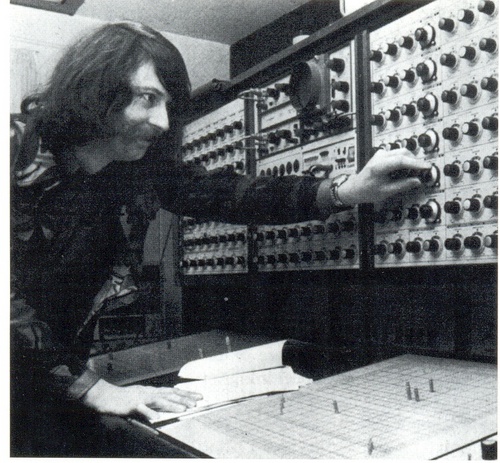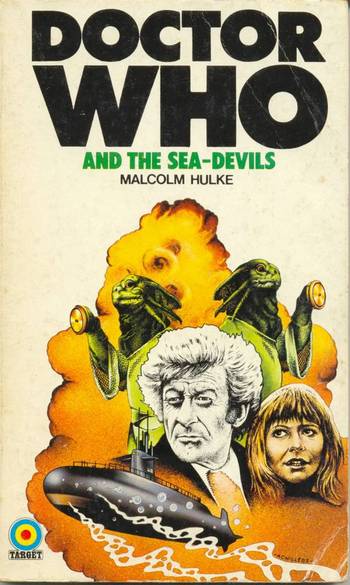August 07, 2006
Requiem for popular modernism
It's hard not to read Woebot's indispensable'Prehistory of British Electronic Music' as a requiem for popular modernism in British cultural life.
Matt argues that, by contrast with the US, where 'electronics seeped out of the Universities and Laboratories fairly early on and managed to permeate Soul (Tonto/Stevie Wonder/Syreeta), Jazz Funk (Dr.Partick Gleeson/Herbie Hancock) even Folk (Czaajkowski/Buffy Sainte -Marie)', electronic experimentalism was peripheral in Britain. That might be the case with Pop, but electronic experimentalism was subtly pervasive in the UK very quickly, because of the work of the Radiophonic Workshop. As I tried to suggest in the section about Delia Derbyshire I wrote for londonunderlondon, the Radiophonic Workshop's 'earworms' - its local radio idents as well as its better known TV themes and incidental soundscapes - were genuinely unheimlich, unhomely, a familar-alien presence that successfully insinuated itself into the interstices of the domestic environment at its most banal.
What was most remarkable about this is that it was incursion without entryism. There was no attempt to tone down the electronics in order to make them more palatable. On the contrary, as Nick Gutterbreakz pointed out in his excellent piece on the Workshop and Dr Who cover art, Malcolm Clarke's astonishing soundtrack for the Sea Devils 'made Throbbing Gristle look like a bunch of fucking pussies - three years before they even existed.'
What a contrast with the lame, sub-John Williams syrup that the BBC ladles over the current Dr Who series. This shrill, postmodern confectionery couldn't be less unheimlich. By firm contrast with the radiophonic's anempathic sounds, which rendered even the most everyday scene weird and alienating, the new music Tells You Exactly What to Feel; it's all too appropriate for the post-OC emotional pornography into which the series has devolved.
(Incidentally, the covers for the 70s Dr Who Target adaptations about which Nick wrote so lovingly form a similarly horrible contrast with the flashy Photoshop trash used on the book and DVD covers for the new series.)
UPDATE:
Jon Wozencroft replies:
- I have to take issue with you that "Electronic experimentation was peripheral in Britain"... another argument could be put forward that it was absolutely the foundation stone of how we presently navigate popular culture. Take "Telstar", where Joe Meek's production techniques find symbiosis with a news story-of-the-day. Then "Tomorrow Never Knows", in which the laddish roots of The Beatles flower into a strange meeting between Liverpudlian poetry and The Tibetan Book of the Dead. You could trace a definite line between all previous uses of electronics and how you end up with Cabaret Voltaire - "No Escape" being a key recording in this respect, a cover version of The Seeds.
In other words, just as you have the seedbed of works done by Tim Souster and Trevor Wishart in the 1970s, so too do you have smash hits like "Popcorn" by Hot Butter and the enormous impact of Boney M and then "I Feel Love" - although originated in Germany (there's another story), the main impact was felt in the UK.
In the USA, one of the most influential "electricians" is Curtis Roads, who does indeed operate out of a University context (Texas?), but then so does Wishart (York) as did Gavin Bryars (Leicester) and now does David Toop (LCC). It's not as simple as it looks.
It's also worth mentioning that there are loads of influential groups beyond Pulp that have come out of an academic context - notably Wire.
But if we are stretching the remit a bit here, let's go back to the Radiophonic Workshop and Dr. Who and make the connection with Bill Drummond and the KLF.
Nevertheless, I think it is worth making a distinction between sonic popular culture and Pop here. It seems to me that the whole of Sixties Pop experimentation was rendered conservative - even obsolete - in advance by Delia Derbyshire's Dr Who theme. It would be over 20 years before Pop - in the form of Acid House - would catch up with Derbyshire's electronic abstraction. The Radiophonic Workshop's 'peripheral' position (in relation to Pop spectacle) was precisely what allowed it to be pervasive at the level of the Sonic Unconscious.
UPDATE 2:
Jon Wozencroft repies again:
- Delia's theme music has a dimension with Pop in so much as it was etched on your brain, the mood was so powerful. I remember we used to try and re-enact it vocally as children, our first karaoke if you like, and even when we knew the theme tune backwards and the title sequence backwards, we would still hide behind the sofa in the living room when the programme came on, in homage.
It was always on early on a Saturday evening in those days. In an era (ear) of programming genius, it came on shortly after the football results. Also, the bitter aftermath of the 1963 extreme cold winter and the JFK assasination. An aspect you don't mention is the role of the Daleks in all this. (Years later, Gary Numan would emerge as "the human Dalek", but that's another story). The use of processed voice here is very significant and it also has an echo/collocation with the EVP recordings I gave you today. The Daleks were of course from another world, but the "am I human/am I a machine?" dichotomy is writ large here. In some preconfiguration of the post Lacan/Deleuzean "fold", language is lost and all that can be said is "exterminate, exterminate"!
I was still at (nursery) pre-school, and Kellogs cornflakes started a campaign whereby they gave you cardboard cut-out sections of a Dalek that you could collect and then reassemble to make your own miniature version. I might be wrong in this, but I seem to remember that this co-incided (co-insided) with the emergence of The Beatles as an electric force ("A Taste of Honey" by this time had become "A Hard Days Night") and the imminence of The Kinks.
The Kinks, I would imagine, were watching more episodes of Dr. Who than The Beatles had time to do.

